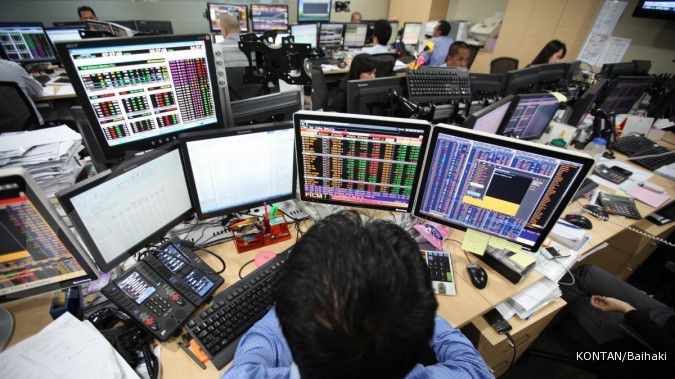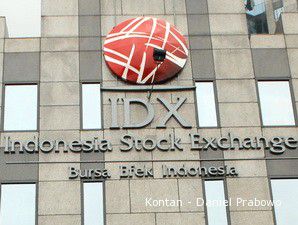JAKARTA. The number of individual investors involved in trading activities in the Indonesian Stock Exchange (IDX) remains low despite the rapid growth of the market in the past several years.The stock market authority blames the low participation of individual investors, or retail investors, on their lack of knowledge of the importance of the capital market in their investment planning.Data from the Indonesian Central Securities Depository (KSEI) shows that the total investment in the country’s equity market rose by 20.7 percent to reach Rp 2,524 trillion (US$258.39 billion) in 2012. Foreign investors made up more than half of the figure with Rp 1,484 trillion, up 18.6 percent from 2011.Meanwhile, the contribution from domestic investors surged 24 percent to Rp 1,040 trillion, but with only 13.5 percent of this figure, or Rp 140.03 trillion, coming from retail or individual investors. The retail figure itself declined 7.2 percent from a year before.According to the KSEI data, as of April 2013, there were only 279,256 registered individual investors, which showed a mere 4.3 percent increase year-on-year, despite the increase in the number of the people entering the consuming class, which refers to individuals with an annual net income of at least $3,600.McKinsey Global Institute reported that the number of retail investors in the local stock market amounted to only 0.6 percent of the consuming class in 2012 or only 0.1 percent of the country’s total population. According to the agency, Indonesia has 45 million people in the consuming class, which account for 74 percent of the gross domestic product (GDP). The consuming class comprises individuals with net income of $3,600 a year. The number of retail investors has shown slow growth despite the remarkable growth in the country’s capital market in recent years. The market capitalization had reached Rp 5,020 trillion as of May 17, a nearly five-fold increase on the Rp 1,076 trillion in 2008. The number of listed companies has also increased significantly to 463 companies at present from 396 companies in 2008.The Jakarta Composite Index (JCI), the barometer of the IDX, surpassed the psychological level of 5,000 last month and stood at 5,141 on Friday, more than double the level recorded in 2008.IDX president director Ito Warsito said that the bourse acknowledged the potential that retail investors could bring to the stock market and that over the years it had initiated many attempts to increase their number.It started an education program back in 2006, which is available for free in Jakarta and Surabaya, East Java. “We educate tens of thousands of people every year, but not all of them end up investing in the market,” he said recently.To attract investors, the bourse also operates information centers in 17 cities and more than 100 IDX galleries at universities. It has established the Jakarta Islamic Index (JII) and the Indonesian Sharia Stock Index (ISSI) as well, to cater to Muslim investors, but so far, none of the attempts have been very successful in boosting the number of retail investors to a significant percentage of the population; at least 5 percent of the so-called consuming class.In this year’s second half, the IDX will embark on yet another attempt to lure more retail investors and increase market liquidity. It plans on reducing the lot size of the shares to 100 shares from 500 shares.IDX corporate listing director Hoesen said that the size reduction would hopefully make investing more attractive and affordable to people. Following the reduction, shares of PT Astra International (ASII), for example, can be purchased for around Rp 720,000 per lot, lower than its current price which stands at Rp 3.6 million per lot.KSEI research and business development division head Syafruddin said that he did not believe that the availability of funds played as pivotal a role as financial literacy in luring potential retail investors into the stock market. “We know that the money is there, but people seem to be unwilling to invest in equities. I think it is because they do not have enough understanding of the stock market yet,” he said. Meanwhile, those who did understand preferred to use the stock market to generate short-term profits by trading rather than investing, Syafruddin said.Commenting on the lot size change, the Indonesian Publicly Listed Companies Association (AEI) chairman Airlangga Hartato insisted that it was more important to encourage first-time retail investors to invest their money in mutual fund products, citing the relatively low risk offered by them.“We should boost investor confidence as well so that they are certain that the stock market is another good investment option besides savings,” he added.Separately, OJK chairman Muliaman Hadad said that it had established an OJK call center to assist people in their inquiries into financial services, including the stock market. He also called on financial services firms to expand their network to reach more potential investors. “Hopefully we will see a significant increase in the next 10 years,” Muliaman said. (Tassia Sipahutar/The Jakarta Post)
Wanted: More local retail investors in IDX
JAKARTA. The number of individual investors involved in trading activities in the Indonesian Stock Exchange (IDX) remains low despite the rapid growth of the market in the past several years.The stock market authority blames the low participation of individual investors, or retail investors, on their lack of knowledge of the importance of the capital market in their investment planning.Data from the Indonesian Central Securities Depository (KSEI) shows that the total investment in the country’s equity market rose by 20.7 percent to reach Rp 2,524 trillion (US$258.39 billion) in 2012. Foreign investors made up more than half of the figure with Rp 1,484 trillion, up 18.6 percent from 2011.Meanwhile, the contribution from domestic investors surged 24 percent to Rp 1,040 trillion, but with only 13.5 percent of this figure, or Rp 140.03 trillion, coming from retail or individual investors. The retail figure itself declined 7.2 percent from a year before.According to the KSEI data, as of April 2013, there were only 279,256 registered individual investors, which showed a mere 4.3 percent increase year-on-year, despite the increase in the number of the people entering the consuming class, which refers to individuals with an annual net income of at least $3,600.McKinsey Global Institute reported that the number of retail investors in the local stock market amounted to only 0.6 percent of the consuming class in 2012 or only 0.1 percent of the country’s total population. According to the agency, Indonesia has 45 million people in the consuming class, which account for 74 percent of the gross domestic product (GDP). The consuming class comprises individuals with net income of $3,600 a year. The number of retail investors has shown slow growth despite the remarkable growth in the country’s capital market in recent years. The market capitalization had reached Rp 5,020 trillion as of May 17, a nearly five-fold increase on the Rp 1,076 trillion in 2008. The number of listed companies has also increased significantly to 463 companies at present from 396 companies in 2008.The Jakarta Composite Index (JCI), the barometer of the IDX, surpassed the psychological level of 5,000 last month and stood at 5,141 on Friday, more than double the level recorded in 2008.IDX president director Ito Warsito said that the bourse acknowledged the potential that retail investors could bring to the stock market and that over the years it had initiated many attempts to increase their number.It started an education program back in 2006, which is available for free in Jakarta and Surabaya, East Java. “We educate tens of thousands of people every year, but not all of them end up investing in the market,” he said recently.To attract investors, the bourse also operates information centers in 17 cities and more than 100 IDX galleries at universities. It has established the Jakarta Islamic Index (JII) and the Indonesian Sharia Stock Index (ISSI) as well, to cater to Muslim investors, but so far, none of the attempts have been very successful in boosting the number of retail investors to a significant percentage of the population; at least 5 percent of the so-called consuming class.In this year’s second half, the IDX will embark on yet another attempt to lure more retail investors and increase market liquidity. It plans on reducing the lot size of the shares to 100 shares from 500 shares.IDX corporate listing director Hoesen said that the size reduction would hopefully make investing more attractive and affordable to people. Following the reduction, shares of PT Astra International (ASII), for example, can be purchased for around Rp 720,000 per lot, lower than its current price which stands at Rp 3.6 million per lot.KSEI research and business development division head Syafruddin said that he did not believe that the availability of funds played as pivotal a role as financial literacy in luring potential retail investors into the stock market. “We know that the money is there, but people seem to be unwilling to invest in equities. I think it is because they do not have enough understanding of the stock market yet,” he said. Meanwhile, those who did understand preferred to use the stock market to generate short-term profits by trading rather than investing, Syafruddin said.Commenting on the lot size change, the Indonesian Publicly Listed Companies Association (AEI) chairman Airlangga Hartato insisted that it was more important to encourage first-time retail investors to invest their money in mutual fund products, citing the relatively low risk offered by them.“We should boost investor confidence as well so that they are certain that the stock market is another good investment option besides savings,” he added.Separately, OJK chairman Muliaman Hadad said that it had established an OJK call center to assist people in their inquiries into financial services, including the stock market. He also called on financial services firms to expand their network to reach more potential investors. “Hopefully we will see a significant increase in the next 10 years,” Muliaman said. (Tassia Sipahutar/The Jakarta Post)





